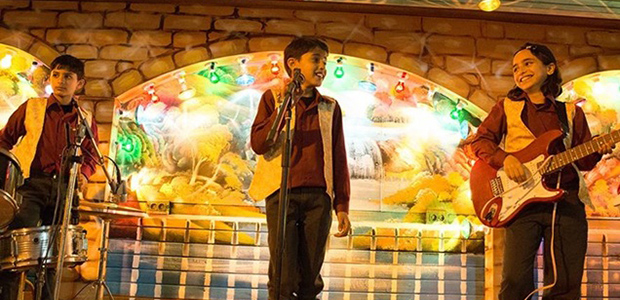
Director Hany Abu-Assad is a bold singularity in the nearly non-existent Palestinian film industry, making films about the Palestinian cause that are full of substance, bringing much needed attention to the plight of people in his country. While his previous efforts have been extraordinary yet grim, Abu-Assad tries his hand at telling a more uplifting tale, though the results are mixed.
I admit to being ignorant about his subject in this film, Mohammad Assaf, except for knowing that he won the Arab Idol competition a few years ago. Hany’s film, about Assaf’s rise from obscurity to stardom in the Arab world, ala Slumdog Millionaire, works, cinema magic, at least during the first half, before falling into convention. Tunneling back into Assaf’s past (some of it fictionalized) it portrays a moving account of him and especially his vivacious sister’s early days trying to earn money as a band using ingenious methods before settling on the steady income that singing at weddings brings. These scenes are not only the best aspect of this largely uplifting film but also showcase the greatest work Abu-Assad has ever done.
In these early portions, Abu-Assad not only builds on his repertoire as a director exploring the hardships of everyday life under the illegal occupation that the Palestinian’s endure but also continues to explore his fascination of how friendships evolve (also witnessed in his remarkable debut Paradise Now and it’s impressive follow-up Omar). Perhaps best of all, the director seems to take a cue from the films of the recent Iranian neorealism, specifically the work of Majid Majdi, to create a believable and sincere portrait of childhood that is free of scrutiny, full of hope and most of all feels honest.
When the story picks up many years later, it recreates the months and weeks leading up to Assaf’s first televised broadcast via Skype, his impossible journey from Gaza to Egypt for the initial selection, and then finally to Beirut for the actual Arab Idol competition rounds. All these moments underscore the great adversity that he had to undergo but are also less vibrant than the first half, feeling almost rushed in covering so much of what actually transpired. Abu-Assad is smart not to give us the details of how Assaf did in the actually competition because by then we’ve seen his resilience and his use of actual footage with film footage helps cut to the chase. Still, I wish the latter half had the same energy and patience as the former but despite this complaint, the film does what it sets out to do – continue the director’s crusade of defiance using cinema as a tool, and for that reason alone, it deserves to be seen.
Rating: 



